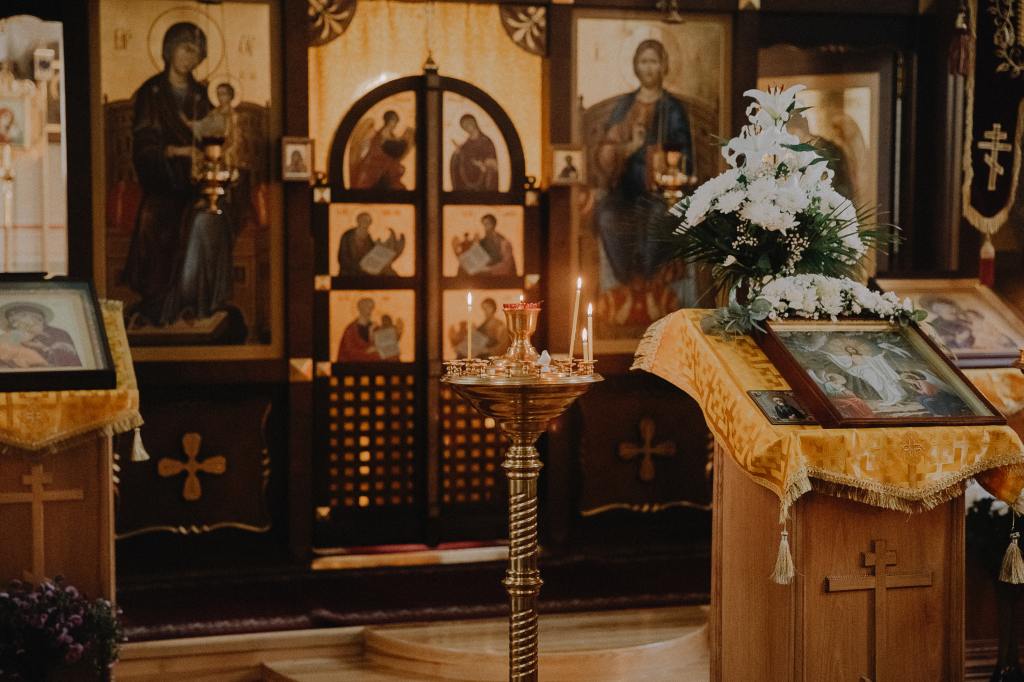
I remember the first time I attended an Orthodox Divine Liturgy. Walking in the door was almost overwhelming. The lingering scent of incense was unmistakable, and unlike any olfactory experience I’ve ever had at church. And it was equally visually stunning, being surrounded with iconongraphy: saints, cherubim, biblical scenes, and especially Christ and the Theotokos. As people came in they would venerate the prominent icons on the icon stands. (I’d already been introduced to the Orthodox theology of icon veneration and so it wasn’t the shock of assumed idolatry that many other Protestants often have.) People would also light candles.
And there were pews, but they didn’t get used much. While some people sat when standing was too difficult, the congregation stood for the entire service. The entire liturgy was chanted, and it was almost a dialogue between the priest chanting and the congregation (facilitated by the choir) singing. The whole service was melodic. And more incense–Psalm 141 was prominent in my mind.
And it was a moment that I felt like I was in heaven. The ancient Liturgy being chanted and the theologically rich and beautiful hymns (all unaccompanied), the smell of the incense, the being surrounded by icons, it was a multisensory experience of being caught up in the Divine life. It was an experience of transcendence.
It was not exciting, it was transcendent, and the difference is important
Excitement and Transcendence and the Search for Something
Growing up, if I had to describe my experience of church with one word, it would be boring. (A close second word is loving, I felt great love from the congregation, do not misunderstand me.) There were hymns, prayers, but the focus was on the sermon, the monologue that I tended to sleep, or read, through (real confession–and apologies to my pastors growing up). I always had a felt desire for something else. I assumed, like so many Protestants, that the something else was excitement. The evangelical church in town had a worship band with guitars and drums and it must have been so exciting, I would think.
And there is an affective element to religious experience, which can get lost, especially in historic Protestant traditions, for all sorts of reasons. But rather than dig deeper into the Christian tradition to find something to meet the longing that we have no language to name, we seek excitement. Lights, loud music, guitars and drums, a charismatic and dynamic preacher (in many evangelical churches called a teacher).
Now, I’m not going to grumble about modern worship forms, and there’s nothing inherently wrong with any of these things, these are all preferences and there was a time when the organ was a newfangled technology. However, there is one key flaw in the quest for excitement: it engages the affective element to religious experience by our own creation, and one has to keep creating these exciting experiences one after another. The flaw is that it is dependent upon us to create these experiences. It is, chasing spiritual highs and always searching for the next big thing.
And there was a period where that worked. Especially with Baby Boomers becoming dissatisfied with their church experience, the excitement was a big draw. Of course, we are in a different world now, and excitement abounds. I can listen to great music on high quality speakers by touching my phone a few times. I can open up a podcasting app and listen to a seemingly endless amount of excellent talks and discussions and presentations. And when church is the place where we hear great music and dynamic messages, then in the contemporary world, we can see the fundamental flaw: church becomes irrelevant. After all, I carry around a novelty machine in my pocket.
What I experienced in the Episcopal and then later Orthodox parishes was not excitement, far from it. Those were, perhaps, less exciting than the typical American Protestant churches which which I was familiar. Rather, what I experienced was transcendence. Transcendence is something that we can make space for, something that we can create a space which encourages it, but ultimately, an experience of transcendence is something that God does, rather than us. While there was novelty to me in these traditions that carried along much of the ancient practices, there was nothing novel in them. In fact, they are largely anti-novelty. The words of the Divine Liturgy in the Orthodox church is largely the same words that have been uttered in churches since the fifth century! (The biggest difference between now and then is that I heard the liturgy in English rather than in Greek.)
It is this experience of transcendence which came not from novelty or excitement, but rather from a complete and enveloping sense of an experience with God. And this is something that cannot be replicated by Spotify.
Liturgy as an Encounter with God
We have all sorts of ideas about what we do when we gather on Sunday mornings (or whenever the normal time for the church community to gather may be). Some of us want to learn, some of us want to be entertained, some of us want to sing, others of us want to pray, many of us want to feel comforted. These are all good things, and I do not criticize any of them. And I wonder how many of us expect a Divine encounter? That is, do we expect to meet God in a real and meaningful way?
This is not to say that we need to introduce hallucinogens to our liturgical practices, but rather, do we go to worship together and expect God to show up in some way, and do we expect to leave feeling like we met God? Because while there can be all sorts of other good desires, like above, if an encounter with God–not just hearing about God or talking about God but a real encounter with God–isn’t the primary one, I think we have a problem.
The experiential element of Christian worship that was stripped away by many traditions (including my own) during the sixteenth century Protestant Reformation have left us with a largely cognitive and intellectual orientation to faith. We still believe in God, and often (at least in the circles I move in) the emphasis on right belief has been balanced by right action, all of which is good. But it is still, largely, focused at the mind. And this mind-focused orientation doesn’t engage with our bodies or our senses (which are the ways in which we experience reality), and it doesn’t meaningfully engage young children or people with cognitive impairments.
People without the cognitive capacity to understand love can most certainly feel what it is to be loved. And similarly, we all understand various degrees about our faith, but even more than knowing about God is having an encounter with God.
How might our experience of worship be different if we expected to have a real encounter with the Divine?
I do wonder if the desire for excitement and novelty is actually the result of a misdirected search for transcendence, especially since for many of us Protestants, “transcendence” is not a word in our common lexicon.
So What Do We Do?
In case anyone from my congregations is reading this, I don’t intend on swinging a thurible this Sunday or erecting an icon screen, so don’t worry. But I do wonder if there are ways that we can create space for experiences of transcendence? This is one of the reasons for weekly Eucharistic celebration, as it allows us to have a real encounter with the living Christ every time we gather. But I wonder if there are other ways that we can create space for transcendence, for close encounters of the divine kind? How might we engage the senses in a meaningful way like the faithful have done throughout the ages, not only in the early church but all the way back into the most ancient practices of the Hebrew people? Transcendence is not something that we can create, but it is something we can make space for, and that, I think, is what will be most essential for the church in this next chapter. Rather than asking how can we make sure that people have all the right doctrinal points, I wonder if the question we should be asking is: How can we help our people to encounter God in a real and meaningful way?
And then from this, we help them understand what it is to do justice, and love kindness, and walk humbly with God.


Join in and share your thoughts!